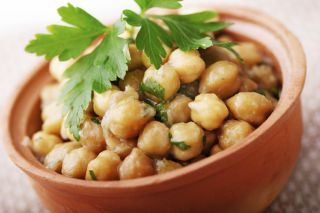Diet
Beans, Beans, They Really Are Good For Your Heart!
Simple, affordable, delicious. And now, (largely) toot-free!
Posted April 8, 2014

Spanish chickpea salad
Remember this cheeky ditty? “Beans, Beans, they’re good for your heart; the more you eat, the more you fart; the more you fart the better you feel; so eat your beans at every meal!”
Well, now there’s scientific basis to this exuberant rhyme: According to Canadian researchers, eating one serving a day of beans, peas, chickpeas or lentils (known as legumes or pulses) can significantly reduce our so-called “bad cholesterol” and therefore the risk of cardiovascular disease.
Their study, published today in the Canadian Medical Association Journal, found that by eating one serving a day of legumes, people could lower their LDL cholesterol by five per cent.
According to lead author Dr. John Sievenpiper of the St. Michael Hospital’s Clinical Nutrition and Risk Factor Modification Center, this could translate into a five to six per cent reduction in the risk of cardiovascular disease in Canada. Heart disease is the leading cause of death in the U.S., closely followed by cancer.
One serving of legumes is 130 grams or ¾ cup, yet Canadians – and presumably the rest of us in the industrialized west -- on average eat less than half a serving a day. Most people in North America would have to more than double their consumption of legumes to reach that target, said Dr. Sievenpiper.
The study is based on a meta-analysis that reviewed 26 randomized controlled trials including 1,037 people. Men were found to have a greater reduction in LDL cholesterol compared with women, perhaps because their diets are poorer and cholesterol levels are higher, and they benefit more markedly from a healthier diet, the Canadian researchers hypothesize.
The many benefits of legumes
Legumes – a staple in the Mediterranean Diet -- have so much going for them, I don't know where to start.
For one, they have a modest glycemic impact (meaning they convert slowly into blood glucose and therefore don’t cause glycemic spikes); this is associated with a reduced risk of heart disease, cancer, diabetes and obesity.
Because they are packed with fiber and protein, they help to keep us sated longer, preventing snack-attacks.
As if this weren’t enough, beans – especially red, pink and black ones – contain a wealth of antioxidant polyphenols though to protect our cells from free-radical attack and lower the risk of disease.
Moreover, legumes are a source of phytoestrogens, natural compounds that resemble estrogens and are thought to lower our risk of certain types of cancer and osteoporosis.
Finally, legumes are cheap and easy to store, which is why they’re so popular in less-affluent countries.
You don’t have to “toot” to enjoy the “musical fruit”
It’s the high oligosaccharides – a type of carbohydrate – in beans that cause the dreaded gastrointestinal effects celebrated in the bean ditty: Bacteria in the large intestine digest these sugars, producing carbon dioxide and hydrogen. These gases are expelled from the body as flatulence.
However, you don’t have to sign up for a life of flatulence by shifting to a higher intake of legumes. For one, most people who eat legumes regularly notice a gradual reduction in these embarrassing but entirely harmless symptoms as their organism and gut bacteria adapt to the increased legume intake.
If you don’t want to wait for this adaptation process to run its course, however, there are other ways to make legume easier to digest.
Many bean recipes call for soaking beans in water overnight before cooking. Soaked beans take less time to cook, and they also ferment a little. Fermentation makes the beans easier to digest, so your gut doesn't have to work so hard and you produce less gas.
By adding two types of beneficial bacteria (probiotics) to the soaking water, the gas-inducing effects of beans can be further reduced. Scientists in Venezuela found that adding Lactobacillus casei and Lactobacillus plantarum to soaking water improved the fermentation process by breaking down the fibrous nutrients that can lead to gassy outbursts. After the bacteria had done their thing and the beans were cooked, the amounts of nutrients that could be digested and absorbed from the bean had increased significantly.
Any good health food store should sell probiotic supplements containing L. casei and L. plantarum. They're also available online here.
Lastly, anecdotal evidence suggests that some legumes are “gassier” than others: many of my clients have reported that they find lentils and chickpeas easier to digest than larger, kidney-shaped beans such as navy, kidney, pinto and fava. So if you’re new to legumes, why not start out with lentils (red, brown or the “caviar of lentils,” the dark green French Puy variety). An added benefit is that lentils can even be cooked without soaking! (Though I usually soak them anyway, to speed up cooking times.)
Each issue of Modern Mediterranean Meal Plans, my monthly recipe and meal-planning service (download free issue here), contains at least one legume recipe. The April issue (out next week) will include a Moroccan-inspired springtime stew of lima beans with artichokes. Past issues have featured Lebanese moujadra and Egyptian koshari (delicious Mid-Eastern bean-and-rice combos), Tuscan bean and kale soup, curried red-lentil and apple stew (dal) and French bean mash infused with rosemary and garlic.
Here are some other quick ways to get more beans into your diet:
- Scatter cooked beans or chickpeas over a big, mixed salad
- Add them to soups and stews
- Throw together a quick salad of beans and leftover rice, spring onions, bell pepper cubes, parsley and a glug of lemony olive-oil vinaigrette
- Bean and canned-fish salad (such as the classic Italian tonno e fagioli); this is also a great source of omega-3 fatty acids
- Eat hummus as a snack with carrot sticks or celery
- Mash warm beans, refried-bean style, with garlic, herbs and olive oil as a tasty side-dish
- Fry them up in olive oil with garlic and shredded greens (spinach, arugula, baby broccoli, kale, etc.) for a delicious, quick dinner
- Baked beans for breakfast (avoid sugary shop-bought baked beans; make your own in a slow-cooker)
- Make a big batch of French-style lentil stew including carrots, onions, garlic, celery, leeks, bay leaf and thyme, season with a splash of balsamic vinegar and freeze in smaller portions quick, re-heatable meals (this tastes good cold, too, drizzled with a little balsamic vinaigrette)
If you need help learning to love beans (and other healthy Mediterranean foods), why not book a Mediterranean-Diet consultation? You can find out about my coaching services here.
(c) Conner Middelmann-Whitney. Conner is a nutrition coach and cookbook writer specializing in the Mediterranean diet. She is the author of Zest for Life: The Mediterranean Anti-Cancer Diet . She offers Mediterranean diet coaching (online and in-person) and publishes Modern Mediterranean Meal Plans, a recipe and meal-planning service for busy people wishing to "Mediterraneanize" their diets. For more information about her work, please visit her website, www.modernmediterranean.com.




